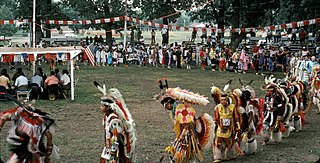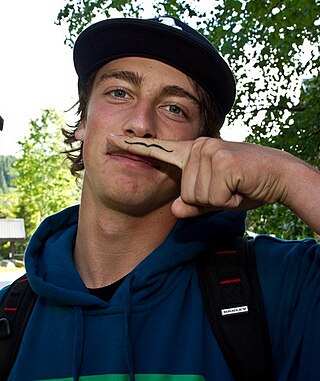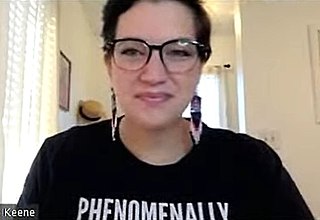Related Research Articles

Nelly Kim Furtado is a Portuguese-Canadian singer and songwriter. She has sold over 45 million records, including 35 million in album sales worldwide, making her one of the most successful Canadian artists. Critics have noted Furtado's musical versatility and experimentation with genres.

A powwow is a gathering with dances held by many Native American and First Nations communities. Powwows today are an opportunity for Indigenous people to socialize, dance, sing, and honor their cultures. Powwows may be private or public, indoors or outdoors. Dancing events can be competitive with monetary prizes. Powwows vary in length from single-day to weeklong events.
"Indian giver" is a pejorative expression used to describe a person who gives a "gift" and later wants it back or who expects something of equivalent worth in return for the item. It is based on cultural misunderstandings that took place between the early European colonists and the Indigenous people with whom they traded. Often, the Europeans viewed an exchange of items as gifts and believed that they owed nothing in return to the Indigenous people. On the other hand, the Indigenous people saw the exchange as a form of trade or equal exchange and so they had differing expectations of their guests.
Cultural appropriation is the inappropriate or unacknowledged adoption of an element or elements of one culture or identity by members of another culture or identity. This can be especially controversial when members of a dominant culture appropriate from minority cultures. When cultural elements are copied from a minority culture by members of a dominant culture, and these elements are used outside of their original cultural context – sometimes even against the expressly stated wishes of members of the originating culture – the practice is often received negatively. Cultural appropriation can include the exploitation of another culture's religious and cultural traditions, dance steps, fashion, symbols, language, and music.
Streetwear is a style of casual clothing which became global in the 1990s. It grew from New York hip hop fashion and Californian surf culture to encompass elements of sportswear, punk, skateboarding, 1980s nostalgia, and Japanese street fashion. Later, haute couture became an influence, and was in turn influenced by streetwear. Streetwear centers on comfortable clothing and accessories such as jeans, T-shirts, baseball caps, and sneakers. Brands may create exclusivity through artificial scarcity; enthusiasts follow particular brands and try to obtain limited edition releases, including via proxy purchases.

War bonnets are feathered headgear traditionally worn by male leaders of the American Plains Indians Nations who have earned a place of great respect in their tribe. Originally they were sometimes worn into battle, but they are now primarily used for ceremonial occasions. In the Native American and First Nations communities that traditionally have these items of regalia, they are seen as items of great spiritual and political importance, only to be worn by those who have earned the right and honour through formal recognition by their people.

LaDonna Vita Tabbytite Harris is a Comanche Native American social activist and politician from Oklahoma. She is the founder and president of Americans for Indian Opportunity. Harris was a vice presidential candidate for the Citizens Party in the 1980 United States presidential election alongside Barry Commoner. She was the first Native American woman to run for vice president. In 2018, she became one of the inductees in the first induction ceremony held by the National Native American Hall of Fame.

Loose is the third studio album by Canadian singer-songwriter Nelly Furtado, released on 7 June 2006, by Geffen and Mosley Music Group. Recording sessions for Loose took place from 2005 to 2006. Timbaland and his protégé Danja produced the bulk of the album, primarily a pop album which incorporates influences of dance, R&B, hip hop, latin pop, synth-pop, reggaeton, new wave, funk, and Middle Eastern music. Lyrically, it explores the theme of female sexuality and has been described as introspective.

"Maneater" is a song by Canadian singer Nelly Furtado from her third studio album, Loose (2006). The song was written by Furtado, Jim Beanz, and its producers Timbaland, and Danja. It was released to mainstream radio in the United States in July 2006. The song's musical style and production were inspired by the Hall & Oates song of the same name and other music from the 1980s.

Canadian singer Nelly Furtado has released six studio albums, 32 singles, one video album, one live album, two compilation albums, three extended plays, and 23 music videos. She released her debut album Whoa, Nelly! in 2000 and it became a commercial success selling 6 million copies worldwide. It has been certified multi Platinum in countries such as Canada, United States, Australia and New Zealand. The album spawned four singles including the successful top 10 hits "I'm Like a Bird" and "Turn Off the Light". In 2003 she released her second album Folklore, while the album did not match the success of her previous album in such markets as the US and Australia, it did however become a success in several European countries. Folklore has sold 2 million copies worldwide. The album produced two European top 10 hits: "Powerless " and "Força", while "Try" peaked inside the top 10 in Canada.

The 21st-century hipster is a subculture. Fashion is one of the major markers of hipster identity. Members of the subculture typically do not self-identify as hipsters, and the word hipster is often used as a pejorative for someone who is pretentious or overly concerned with appearing trendy.

Mi Plan is the fourth studio album and the first Spanish-language album by Canadian singer-songwriter Nelly Furtado. It was released independently on September 11, 2009 by Furtado’s own record label Nelstar Entertainment with distribution by Universal Music Latino. This marks Furtado’s first independently released album. Recording sessions for the album took place from 2008 to 2009. The album was produced primarily by Furtado with other contributions made by James Bryan, Lester Mendez, Salaam Remi, The Demolition Crew, Julieta Venegas and Brian West. Furtado described the songs on the album to be "simple love songs".

The 2010s were defined by hipster fashion, athleisure, a revival of austerity-era period pieces and alternative fashions, swag-inspired outfits, 1980s-style neon streetwear, and unisex 1990s-style elements influenced by grunge and skater fashions. The later years of the decade witnessed the growing importance in the western world of social media influencers paid to promote fast fashion brands on Pinterest and Instagram.

The Spirit Indestructible is the fifth studio album by Canadian singer-songwriter Nelly Furtado. The album was released on 14 September 2012. Furtado served as the executive producer for the album as well as a principal writer. Further production on The Spirit Indestructible comes from the likes of Darkchild, Salaam Remi, Mike Angelakos, Bob Rock, Fraser T Smith, Di Genius, The Demolition Crew, John Shanks and Tiësto.

The Halluci Nation, formerly known as A Tribe Called Red, is a Canadian electronic music group who blend instrumental hip hop, reggae, moombahton and dubstep-influenced dance music with elements of First Nations music, particularly vocal chanting and drumming. Based in Ottawa, Ontario, the group consists of Tim "2oolman" Hill, and Ehren "Bear Witness" Thomas. Former members include co-founder DJ Jon Deck and Dan "DJ Shub" General, who left the band for personal reasons in spring 2014, and was replaced by Hill. Co-founder Ian "DJ NDN" Campeau left the band for health reasons in October 2017, with the band opting to remain a duo for the time being.
Hipster racism is engaging in behaviors typically regarded as racist and defending them as being performed ironically or satirically. Rachel Dubrofsky and Megan W. Wood have described it as being supposedly "too hip and self-aware to actually mean the racist stuff one expresses". This might include wearing blackface and other performances of stereotyped African Americans, use of the word nigger, and appropriating cultural dress. Talia Meer argues that hipster racism is rooted in what she calls "hipster exceptionalism", meaning "the idea that something ordinarily offensive or prejudiced is miraculously transformed into something clever, funny and socially relevant, by the assertion that said ordinarily offensive thing is ironic or satirical." As Leslie A. Hahner and Scott J. Varda described it, "those participating in acts of hipster racism understand those acts as racist when practiced by others, but rationalize their own racist performances through a presumed exceptionalism."

Redface is the wearing of makeup to darken or redden skin tone, or feathers, warpaint, etc. by non-Natives to impersonate a Native American or Indigenous Canadian person, or to in some other way perpetuate stereotypes of Indigenous peoples of Canada and the United States. It is analogous to the wearing of Blackface. In the early twentieth century, it was often white performers, who wore blackface or redface when portraying Plains Indians in Hollywood Westerns. In the early days of television sitcoms, "non-Native sitcom characters donned headdresses, carried tomahawks, spoke broken English, played Squanto at Thanksgiving gatherings, received 'Indian' names, danced wildly, and exhibited other examples of representations of redface".

Bethany Yellowtail is a Native American fashion designer based in Los Angeles, California. Known for her work that reflects her Indigenous heritage, she is an enrolled member of the Northern Cheyenne Tribe and a descendant of the Crow Tribe of Montana. She serves as designer and CEO for her line B.Yellowtail.

Adrienne J. Keene is a Native American academic, writer, and activist. A member of the Cherokee Nation, she is the founder of Native Appropriations, a blog on contemporary Indigenous issues analyzing the way that Indigenous peoples are represented in popular culture, covering issues of cultural appropriation in fashion and music and stereotyping in film and other media. She is also an assistant professor of American Studies and Ethnic Studies at Brown University, where her research focuses on educational outcomes for Native students.

Native American fashion is the design and creation of high-fashion clothing and fashion accessories by Native Americans in the United States. This is a part of a larger movement of Indigenous fashion of the Americas.
References
- 1 2 "Q&A: How Is The Native College Experience Different?". nprEd. Archived from the original on July 29, 2014. Retrieved April 7, 2016.
- ↑ "Powwow Party Flub Leads To Fashion Line". Npr.org. 12 August 2013. Retrieved 6 January 2015.
- ↑ "Spring's least-wanted fashion trend: The co-opting of Aboriginal dress". Elle Canada. Retrieved 6 January 2015.
- ↑ "Bustle". Bustle.com. 3 February 2014. Retrieved 6 January 2015.
- ↑ "The Real Problem With a Lone Ranger Movie? It's the Racism, Stupid". Indian Country Today Media Network.com. Retrieved 6 January 2015.
- ↑ Keene, Dr. Adrienne, "Magic in North America Part 1: Ugh." at Native Appropriations, 8 March 2016. Accessed 9 April 2016.
- ↑ "Newspaper Rock". Newspaperrock.bluecorncomics.com. Retrieved 6 January 2015.
- ↑ "Spring's least-wanted fashion trend: The co-opting of Aboriginal dress". Elle Canada. Retrieved 6 January 2015.
- ↑ "Fashion designer Paul Frank teams up with Native American artists". Denverpost.com. 17 August 2013. Retrieved 6 January 2015.
- ↑ "Nelly Furtado's "Big Hoops" Video: Native dancers represent!". Native Appropriations. 8 May 2012. Retrieved 6 January 2015.
- 1 2 "BBC News - #BBCtrending: Native Americans reject 'super drunk' label". BBC News. 20 May 2014. Retrieved 6 January 2015.
- ↑ "Powwow Party Flub Leads To Fashion Line". NPR. Archived from the original on April 28, 2014. Retrieved April 7, 2016.
- 1 2 Tansy Hoskins (22 August 2013). "Fake Native American clothing ranges show the darker side of fashion". the Guardian. Retrieved 6 January 2015.
- ↑ Rebekah Zemansky (18 September 2012). "Bloggers Adrienne Keene and Dr. Jessica Metcalfe on Native Headdresses, Patterns, and "Aztec" Labels in Popular Fashion". Jackalope Ranch. Retrieved 6 January 2015.
- ↑ "Don't Trend on My Culture" . Retrieved 6 January 2015.
- ↑ "Johnny Depp as Tonto: Is 'The Lone Ranger' Racist? - TIME.com". TIME.com. 3 July 2013. Retrieved 6 January 2015.